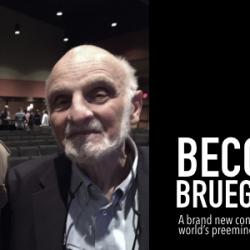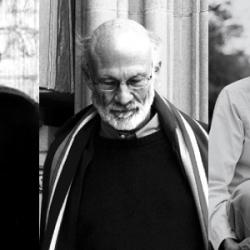This is Part 05 of a series on Walter Brueggemann’s The Prophetic Imagination. It is an attempt to show how theological works are great sources for leadership reflection. If you want to catch up here are links to: Part 01, Part 02, Part 03, Part 04
Part 05: What Walter Brueggemann envisions for a prophetic ministry is a new “consciousness” formed by 1) the rejection of the Royal Consciousness, and 2) an embracing of the prophetic narrative. The Royal Consciousness is the myth that tells us we can generate our own existence; we can be our own keepers; that by hoarding resources we can secure our place in the world. Solomon and Pharaoh are chief exemplars, hoarding women (sex), national identity (over tribal identity), power (bureaucracy), violence (1st standing army), information (hoarded the wise/intellectual class in royal courts), and labor (for national projects). We must all begin with the realization that nearly all Christians who are a part of Western culture are the children of the Royal Consciousness. The turn to the prophetic requires our honesty about this one point.
So, what is the prophet like? The prophet is not grim and grumpy as much as he/she is a playful and poetic dreamer. The prophetic imagination is a kind of artistry.
“The imagination must come before the implementation. Our culture is competent to implement almost anything and to imagine almost nothing. The same royal consciousness that makes it possible to implement anything and everything is the one that shrinks imagination because imagination is a danger. Thus every totalitarian regime is frightened of the artist.” (40)
The prophet can say, creatively, even with great humor that “we are not in charge, that things will not forever stay the manageable way they are, and that things will not finally all work out. It is the business of kings to attach the word “forever” to everything we treasure… but “forever” is always the word of Pharaoh, and as such it is the very word against Yahweh and Moses did their liberating thing.” (42) The RC says all is well. The prophet says that no nation is forever. As the Royal Consciousness numbs the person to the reality of death, its members live as though they think they will not have to die in the end. Death is shunned, sterilized, and antiseptic. The Prophet refuses to allow this deception to go unchecked.
Leadership Reflections:
First, I think it’s pretty clear that church leaders can implement the crap out of anything. We are implementing machines. Give us a model and we’ll implement it and work it to perfection without every really reflecting deeply on whether or not it is corrupted by the Royal Consciousness. Pastors and church leaders are fantastic at implementation, but terrible at imagination: unmasking the insidious narrative of empire that is already at work in our church leadership narrative. Church leaders are so schooled in the art and science of implementation that we have no idea the entire discipline that was created to sustain the empire, or the Royal Consciousness by reminding us that results are all that matters. Church leaders should not first be experts at implementation, but imagination. Sadly this is not what the church leadership conversation fosters. Church leadership models across the board are built upon the narrative of the Royal Consciousness. They are shot-through with pragmatism and the desire for results. The prophet refuses these metrics.
Second, the word “forever” is the word of Pharaoh. The words “All is well” is the business of the happy-ologists like Joel Osteen & the prosperity gospel folks. But the problem runs much deeper than that. Both evangelical churches, and many of the mainline churches have been co-opted by the Royal Consciousness… by the king… by the nation. They preach a gospel which is held captive to the Royal Consciousness. It is the cross-less good news… cheap grace. The state tells all American Christians in no uncertain terms (to paraphrase the words of Warden Samuel Norton from Shawshank prison), “Give your hearts to Jesus, but your ass belongs to me.”
The American Church serves the Royal Consciousness far too faithfully. We play along with the deception that America is exceptional, God’s “city on a hill,” the chosen people, and the new Israel, despite the fact that Jesus intentionally marginalized national distinctions. This is the meaning of Paul’s blunt admonition from Galatians 3: “There is neither Jew nor Greek, slave nor free, male nor female, for you are all one in Jesus Christ.” We put no trust in a nation. We offer our bodies not to the state, but to the Lord of all the earth.
How does a church leader lead people to a prophetic consciousness and away from the Royal consciousness?
To begin with the leader must be willing to go there him/herself. Not with rage on one hand or cheap grace on the other, but with condor, honesty, and grief. We grieve the co-option of the church by the Royal Consciousness. We grieve the sovereignty that the nation enjoys over the people of our congregations who struggle to resist the individualism, consumerism and nationalism into which we are born. We refuse to believe that anything can keep, sustain, protect, and support us long-term other than the hand of God. We bring to the forefront of our days the reality of our own mortality and refuse to be numbed to the ever present reality of death and suffering.
In short we have to weep, and our weeping must be real not contrived. WB says, “Weeping is something kings rarely do without losing their thrones.” (57) But the loss of its throne is the only way for the king to be saved. Brueggemann says the weeping of Jeremiah’s Lamentations, was “nothing less than God’s grief over his dead child [Israel]” (54). We grief over God’s prodigal son: the American Church. Only then will our imaginations cease to be held captive by the society in which we live. Only then will we be able to imagine a creative, hopeful, playful, ingenious response to the failures of the empire. Only then can we truly say that “only those who mourn will be comforted (Matt 5:4). Only those who embrace the reality of death will receive the new life.” (57)












